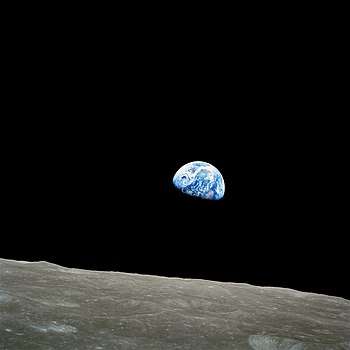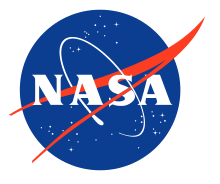Apollo 8 Genesis reading
On Christmas Eve, December 24, 1968, in the most watched television broadcast at the time,[1][2] the crew of Apollo 8 read from the Book of Genesis as they orbited the Moon. Astronauts Bill Anders, Jim Lovell, and Frank Borman, the first humans to travel to the Moon, recited verses 1 through 10 of the Genesis creation narrative from the King James Bible.[3] Anders read verses 1–4, Lovell verses 5–8, and Borman read verses 9 and 10.

Drafting
Borman felt that his initial attempts to draft something appropriate sounded too much like an apology for the United States involvement in the Vietnam War, and Joseph Laitin of the Bureau of the Budget (now the Office of Management and Budget) was brought in to assist.[4][5] Laitin himself had the same problem; his initial drafts centered on the concept of peace on Earth, which felt inappropriate in light of the ongoing war effort, and he began looking through the New Testament to find to find a good connection between the Christmas season and the biblical accounts of the birth of Jesus.[6] The suggestion to instead look to the Old Testament and use the beginning of Genesis came from Christine Laitin, Joseph Laitin's wife.[4][6]
The text was printed on fire-proof paper and included in the mission flight plan.[6]
Transcript
- William Anders
We are now approaching lunar sunrise, and for all the people back on Earth, the crew of Apollo 8 has a message that we would like to send to you.
In the beginning God created the heaven and the earth.
And the earth was without form, and void; and darkness was upon the face of the deep. And the Spirit of God moved upon the face of the waters.
And God said, Let there be light: and there was light.
And God saw the light, that it was good: and God divided the light from the darkness.[7]
- James Lovell
And God called the light Day, and the darkness he called Night. And the evening and the morning were the first day.
And God said, Let there be a firmament in the midst of the waters, and let it divide the waters from the waters.
And God made the firmament, and divided the waters which were under the firmament from the waters which were above the firmament: and it was so.
And God called the firmament Heaven. And the evening and the morning were the second day.[7]
- Frank Borman
And God said, Let the waters under the heaven be gathered together unto one place, and let the dry land appear: and it was so.
And God called the dry land Earth; and the gathering together of the waters called he Seas: and God saw that it was good.
- And from the crew of Apollo 8, we close with good night, good luck, a Merry Christmas – and God bless all of you, all of you on the good Earth.[7]
Lawsuit
Madalyn Murray O'Hair, founder of American Atheists, responded by suing the United States government, alleging violations of the First Amendment.[8] The suit was filed in the United States District Court for the Western District of Texas. It was submitted to a three-judge panel, which concluded that the case was not a three-judge matter, and dismissed the case for failure to state a cause of action.[9] The direct appeal to the Supreme Court was dismissed for lack of jurisdiction.[10] Another appeal was heard before the Fifth Circuit Court of Appeals, which affirmed the trial court's dismissal per curiam.[11] The Supreme Court declined to review the case.[12]
Later, on the 1969 Apollo 11 mission, Buzz Aldrin took Communion on the lunar surface shortly after landing, using bread and wine he brought from his home church congregation. When he tried to speak to the flight crew operations manager and get the permission to broadcast his singular celebration of the Holy Communion service, he was answered with "keep your comments more general".[13] Hence, over the radio he merely asked his listeners to pause and reflect on the events of the last few hours, and give thanks in their own way. He then read the specifically Christian scripture, John 15:5, off-air.[8][14] However, after the Apollo team was reunited and heading back to Earth, Aldrin read aloud a second scripture that was scrawled on the same notecard but of a more universally human reference from the Old Testament, Psalm 8:3–4, "When I considered the heavens, the work of Thy fingers, the moon and the stars which Thou hast ordained, what is man that Thou art mindful of him."[15]
Artifacts
The page of the flight plan with the Genesis passage is on display at the Adler Planetarium in Chicago, on loan from Lovell.[16] In 2018 it was displayed in the National Cathedral in Washington, DC for the fiftieth anniversary of the flight.[16]
In popular culture

Art, entertainment, and media
Music and spoken word
- Mike Oldfield used a part of the reading of Bill Anders in the first and second song of his album "The Songs of Distant Earth" in 1994.[17]
- The Israeli psychedelic trance group Astral Projection used a sample of the recording on their track "Let There Be Light" (1995).
- The Dutch DJ Bakermat used the opening verse of the audio in his single "Uitzicht".
- Christian rock group Brave Saint Saturn sampled the recording in their song "Under Bridges", from the album So Far from Home (2000).
- The East-German alternative rock band Down Below samples the recording at the beginning of their song "How To Die In Space", from the album Silent Wings: Eternity (2004).
- Michael Jackson used the ending part of the Apollo 8 Genesis on his song "HIStory" from his album HIStory: Past, Present and Future, Book I (1995).
- The group MGMT used the verses read by Borman as a sample in the song "Come On Christmas", from the album Climbing To New Lows.
- The Swedish progressive rock band Moon Safari used the first two sentences of Bill Anders' part on their song "Moonwalk".
- The European electronic duo VNV Nation used a sample of the recording on "Genesis", a song from their album, Futureperfect (2002).
- The German Artist Chillwalker used a sample of the recording as the main theme on "The Light of God", a song from his first album, Fine tunes del Mar (2007).
- The Progressive rock band Arena used excerpts of this broadcast in the song "Purgatory Road" from the Pepper's Ghost (2005).
- Electronic music duo W&W used an excerpt of Anders' verse in their song "Lift Off".
Television
- The entire reading is reproduced verbatim in the "1968" episode of the HBO TV miniseries From the Earth to the Moon.
- In the Space: Above and Beyond episode "The River of Stars," the Apollo 8 recording is played for the 58th "Wildcards" Squadron.
- An excerpt from James Lovell's section of the reading was used in the Starz series Outlander, season 3, episode 5.
Postage stamp
In 1969, the United States Postal Service issued a postage stamp (Scott # 1371) to commemorate the Apollo 8 mission and the reading.
Notes
- "Race to the Moon – Telecasts from Apollo 8". American Experience. PBS. September 22, 2005. Archived from the original on 25 December 2008. Retrieved 2008-12-26.
- "The National Archives Features Special Christmas Eve Message from APOLLO 8". U.S. National Archives. December 7, 2006. Archived from the original on 14 January 2009. Retrieved 2008-12-26.
- "The Apollo 8 Christmas Eve Broadcast". NASA National Space Science Data Center. September 25, 2007. Archived from the original on 19 April 2008. Retrieved 2008-04-12.
- Smith, J.Y. (April 6, 1995). "Christine Laitin Dies at 65". The Washington Post. Retrieved July 17, 2019.
- Shribman, David M. (December 22, 2018). "'God bless all of you on the good Earth': Remembering the daring Apollo 8 mission - The Boston Globe". Boston Globe. Retrieved March 20, 2020.
- Watkins, Billy (2007). Apollo Moon Missions: The Unsung Heroes. University of Nebraska Press. pp. 70–71. ISBN 978-0-8032-6041-2.
- Woods, David; O'Brien, Frank (December 27, 2008). "Day 4: Lunar Orbits 7, 8 and 9". The Apollo 8 Flight Journal. NASA History Division. Retrieved May 4, 2015. (Flight time 086:06:40 to 086:08:39)
- Chaikin, Andrew (1994). A Man On The Moon: The Voyages of the Apollo Astronauts. Viking. pp. 204, 623. ISBN 0-670-81446-6.
- O'Hair v. Paine, 312 F. Supp. 434, 436, 438 (W.D. Tex. 1969).
- O'Hair v. Paine 397 U.S. 531 (1970).
- O'Hair v. Paine, 432 F.2d 66 (5th Cir. 1970).
- O'Hair v. Paine 401 U.S. 955 (1971).
- Erin Blakemore (31 July 2018). "Buzz Aldrin took Holy Communion on the Moon. NASA kept it quiet". History.com. A&E Television Networks. Archived from the original on 17 July 2019. Retrieved 19 July 2019.
- B. Mikkelson & D. Mikkelson. "Communion on the moon". snopes.com. Retrieved March 8, 2010.
- Aldrin, Buzz (2009). Magnificent Desolation: The Long Journey Home from the Moon. New York: Harmony Books. pp. 51–52. ISBN 9780307463456. Retrieved 24 July 2019.
- "Spirit of Apollo - 50th Anniversary of Apollo 8 (NHQ201812110003)". Flickr. NASA. December 11, 2018. Retrieved March 20, 2020.
- CD cover reference in "The Songs of Distant Earth" - Mike Oldfield - 1994
External links
- Genesis reading from Apollo 8
- Woods, David; O'Brien, Frank. "Apollo 8 Flight Journal; Day 4: Lunar Orbit 9". NASA History Division. NASA. Retrieved March 20, 2020.
| Wikimedia Commons has media related to Apollo 8 Genesis Reading. |
